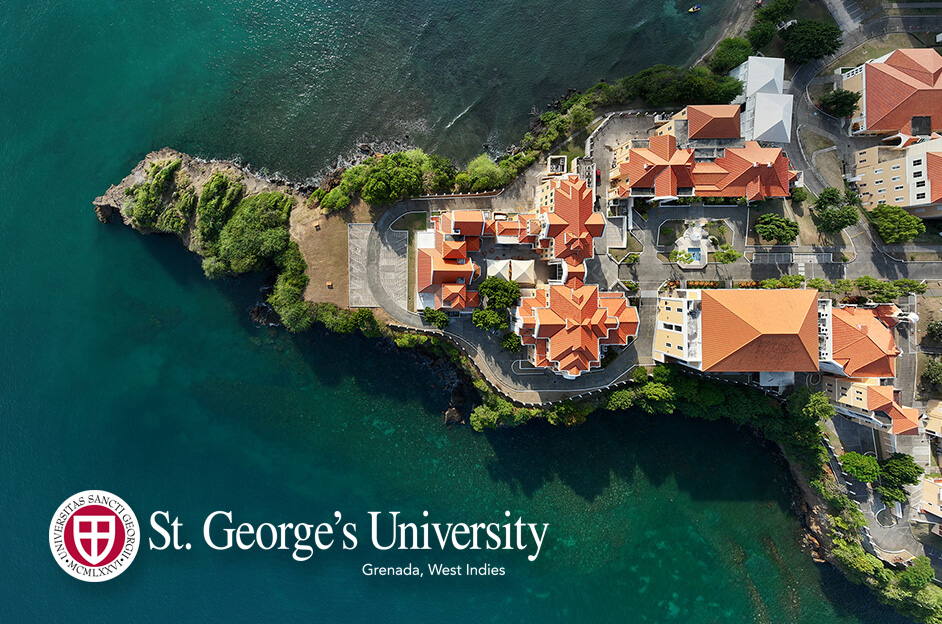[av_slideshow size=’no scaling’ animation=’slide’ conditional_play=” autoplay=’false’ interval=’5′ control_layout=’av-control-default’ av_uid=’av-2q74q4j’ custom_class=”]
[av_slide id=’63424′ av_uid=’av-1wxz25f’][/av_slide]
[av_slide id=’63427′ av_uid=’av-1gqg45f’][/av_slide]
[av_slide id=’63425′ av_uid=’av-1cs7nqb’][/av_slide]
[av_slide id=’63426′ av_uid=’av-qbgfkz’][/av_slide]
[/av_slideshow]
The St. George’s University School of Medicine Alumni Association (SOMAA) invite SGU graduates and all medical professionals to its annual “Art of Medicine” continuing medical education (CME) conference in Grenada from March 9-12, 2020.
According to SOMAA President Bruce Bonanno, MD ’83, SOMAA president, its goal is to further harvest physicians’ passion for medicine, on the island that, for many, is where it all began.
“This conference welcomes doctors to reconnect with their profession, to build upon the foundation they’ve already created, and for SGU graduates, to get back to their roots,” said Dr. Bonanno, an emergency medicine physician based in New Jersey.
The four-day event features presentations from experts on a wide variety of fields, with several discussions led by SGU alumni. They include:
- “Hematologic Disease in Older People” – Shannon O’Connor, MD ’05
- “Headache: It’s All In Your Head” – Paul Mathew, MD ’05
- “Hypoxia – When Seconds Matter” – Pierre Moeser, MD ’83
- “Maintenance of Certification: Reform or Reboot?” – Paul Mathew, MD ’05
- “Monoclonal Antibody Use in Rheumatic Diseases” – Pierre Moeser, MD ’83
- “Decoding the Alphabet Soup of Interstitial Lung Disease (ILD)” – Nirav Shah, MD ’02
- “All About Gout” – Suneet Grewal, MD ’08
- “Genetic Diseases in Cancer” – Shannon O’Connor, MD ’05
- “Hepatitis is a Cure” – George Gartin, MD
- “Psoriatic Arthritis” – Suneet Grewal, MD ’08
- “How to Have a Baby Without Having Sex: New Frontiers in Reproduction” – Samuel Jacobs, MD ’82
- “Acute Respiratory Distress Syndrome (ARDS): Where Are We Now?” – Nirav Shah, MD ’02
- “Nutrition in Chronic Disease” – Taraneh Soleymani, MD ’07
- “Obesity Treatment – How Far Have We Come?” – Sunil Daniel, MD ’07
- “Non-Alcoholic Steatohepatitis (NASH)” – George Gartin, MD
Conference participants are eligible to receive 16 CME credits certified by the American College of Emergency Physicians (ACEP). In addition to the discussion schedule, visitors can enjoy a full slate of leisure activities, including campus tours, dinner at the University Club, catamaran cruises, and more.
“Each year, we have added more and more to the continuing medical education conference in Grenada,” said Dr. Bonanno. “We encourage all alumni to take advantage of this opportunity to learn and to once again enjoy this beautiful island.”
[av_button_big label=’Click here for the complete schedule of events and to register.’ description_pos=’below’ link=’manually,http://www.sgualumni.org’ link_target=” icon_select=’no’ icon=’ue800′ font=’entypo-fontello’ custom_font=’#ffffff’ color=’theme-color’ custom_bg=’#444444′ color_hover=’theme-color’ custom_bg_hover=’#444444′ av_uid=’av-ippbmr’ custom_class=” admin_preview_bg=”][/av_button_big]
